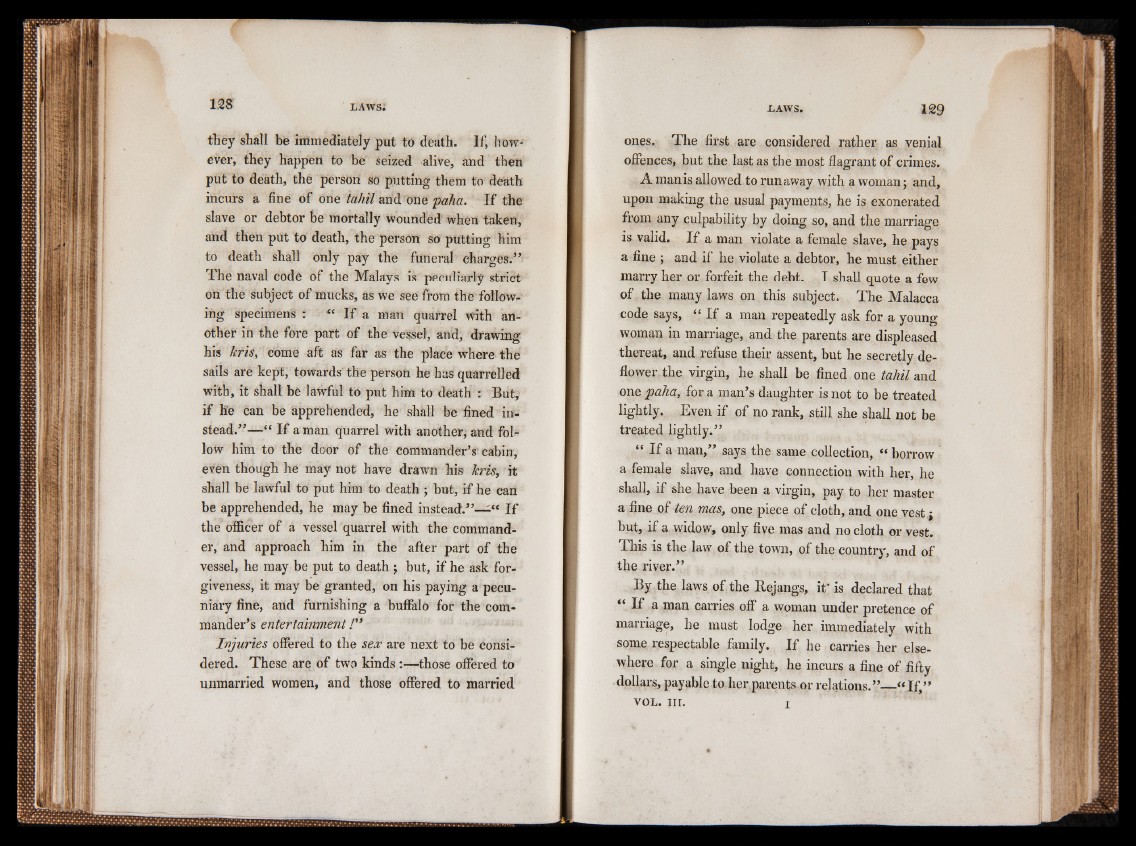
they shall be immediately put to death. If, however,
they happen to be seized alive, and then
put to death, the person so putting them to death
incurs a fine of one tahil and one paha. If the
slave or debtor he mortally wounded when taken,
and then put to death, the person so putting him
to death shall only pay the funeral charges.”
The naval code of the Malays is peculiarly strict
on the subject of mucks, as we see from the following
specimens : “ If a man quarrel with another
in the fore part of the vessel, and, drawing
his kris, come aft as far as the place where the
sails are kept, towards the person he has quarrelled
with, it shall be lawful to put him to death : But,
if lie can be apprehended, he shall be fined instead.”—“
If a man quarrel with another, and follow
him to the door of the commander’s cabin,
even though he may not have drawn his kris, it
shall be lawful to put him to death ; but, if he can
be apprehended, he may be fined instead.”—“ If
the officer of a vessel quarrel with the commander,
and approach him in the after part of the
vessel, he may be put to death; but, if he ask forgiveness,
it may be granted, on his paying a pecuniary
fine, and furnishing a buffalo for the commander’s
entertainment /”
Injuries offered to the sea; are next to be considered.
These are of two kinds:—those offered to
unmarried women, and those offered to married
ones. The first are considered rather as venial
offences, but the last as the most flagrant of crimes.
A manis allowed to runaway with a woman; and,
upon making the usual payments, he is exonerated
from any culpability by doing so, and the marriage
is valid. If a man violate a female slave, he pays
a fine ; and if he violate a debtor, he must either
marry her or forfeit the debt. I shall quote a few
of the many laws on this subject. The Malacca
code says, “ If a man repeatedly ask for a young
woman in marriage, and the parents are displeased
thereat, and refuse their assent, but he secretly deflower
the virgin, he shall be fined one tahil and
one paha, for a man’s daughter is not to be treated
lightly.. Even if of no rank, still she shall not be
treated lightly.”
“ If a man,” says the same collection, “ borrow
a female slave, and have connection with her, he
shall, if she have been a virgin, pay to her master
a fine of ten mas, one piece of cloth, and one vest:
but, if a widow, only five mas and no cloth or vest.
This is the law of the town, of the country, and of
the river.”
By the laws, of the Rejangs, if is declared that
“ If a man carries off a woman under pretence of
marriage, he must lodge her immediately with
some respectable family. If he carries her elsewhere
for a single night, he incurs a fine of fifty
dollars, payable to herparents or relations.” “ If,”
VOL. III. i